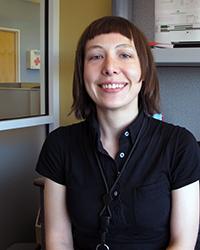Access Services Librarian Helps Students with Information Needs
 Like any good librarian, Robin Milford thoroughly researched UC Merced before joining the campus as an access services librarian in November 2012. In reading about the UC Merced Library, she realized it is truly innovative, not only in terms of its physical space and collections, but also in the services it provides to its users.
Like any good librarian, Robin Milford thoroughly researched UC Merced before joining the campus as an access services librarian in November 2012. In reading about the UC Merced Library, she realized it is truly innovative, not only in terms of its physical space and collections, but also in the services it provides to its users.
Milford wanted her first librarian position to be at a place where she would be encouraged to think creatively and feel challenged in her work. The UC Merced Library, she said, felt like a place where people weren’t afraid to take risks and challenge the research library status quo. She also wanted to serve a diverse student population and the fact that so many UC Merced students are first-generation college students really appealed to her.
What made you interested in becoming an access services librarian? What do you do in this role?
After I got my master’s in library and information science (MLIS) degree in 2009, I spent three years working as an access services assistant at a small college library in Portland, so becoming an access services librarian seemed like a logical and natural progression. What really appeals to me about access services is that the fruits of your labor are always very tangible. I’m a sucker for instant gratification, so for me there’s nothing better than the look of relief and gratitude you see on a student’s face when you can help them find the book or access the journal article they need for their research. You get to provide a lot of front-end customer service, something I genuinely enjoy from my days in retail and food service.
The Access Services department at the UC Merced Library works to connect our users with the library’s physical collections and spaces. As an access services librarian, I manage the daily operations at the Library Help Desk and Services Desk, as well as our Interlibrary Services unit. I also manage our student assistant workforce, the exhibits program, and help with reference and instruction.
What is the most rewarding part of your job?
Helping people! It sounds simplistic, but that’s why I became a librarian. It wasn’t because I love books or technology (although I will admit to geeking out over both on occasion), it was because I wanted to help people, particularly students, with managing their information needs.
What new initiatives/projects/plans are you looking forward to this year?
I don’t know where to begin! I’m fairly new in my position, so I’m still getting my feet wet and learning the ropes. I’m particularly eager to curate some exhibits in the library that really highlight the research of our students and faculty. Access Services is exploring ways to enhance our library services by the improved collection, manipulation and use of statistics on information queries at our public service points. We’re also getting two really cool Zeutschel Zeta book scanners. They provide high-resolution, high-speed scans with a variety of output options.
What are some of the biggest challenges in your work and how do you overcome them?
Having the ability to adapt our existing library services and create new ones to meet user needs within the confines of a shrinking budget is probably the obvious answer. Of course there’s also the requisite multiple-hat-wearing and ball-juggling that goes with working at a newly established organization. I’m constantly amazed at how much the library staff accomplishes on a daily basis with total grace and aplomb. It’s humbling and inspiring.
Tell us something about yourself that most people on campus wouldn’t know.
I’m completely mesmerized and easily distracted by the cows surrounding the campus! Every time I try to explain this to my manager he has a hard time keeping a straight face, but he still humors me. I grew up in very urban environment (a public housing project in Toronto) and didn’t see a cow until I was 18 years old, so to me, they may as well be unicorns.
